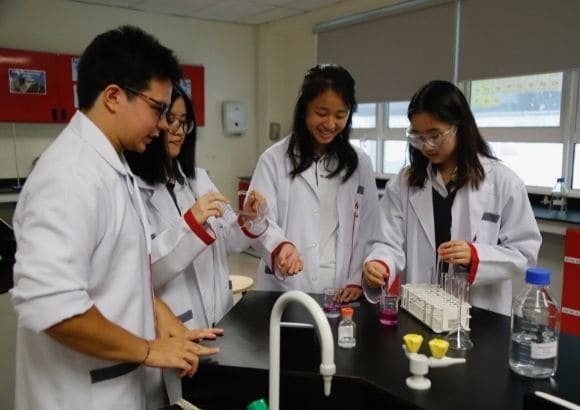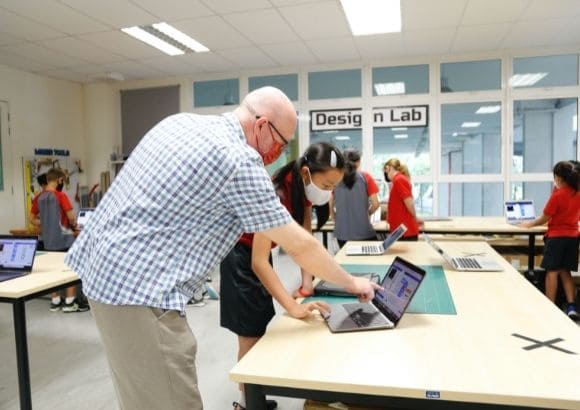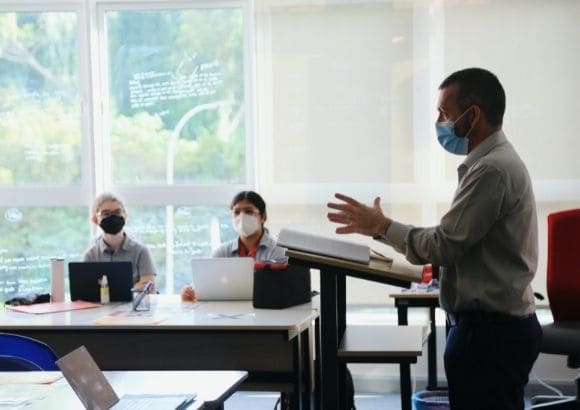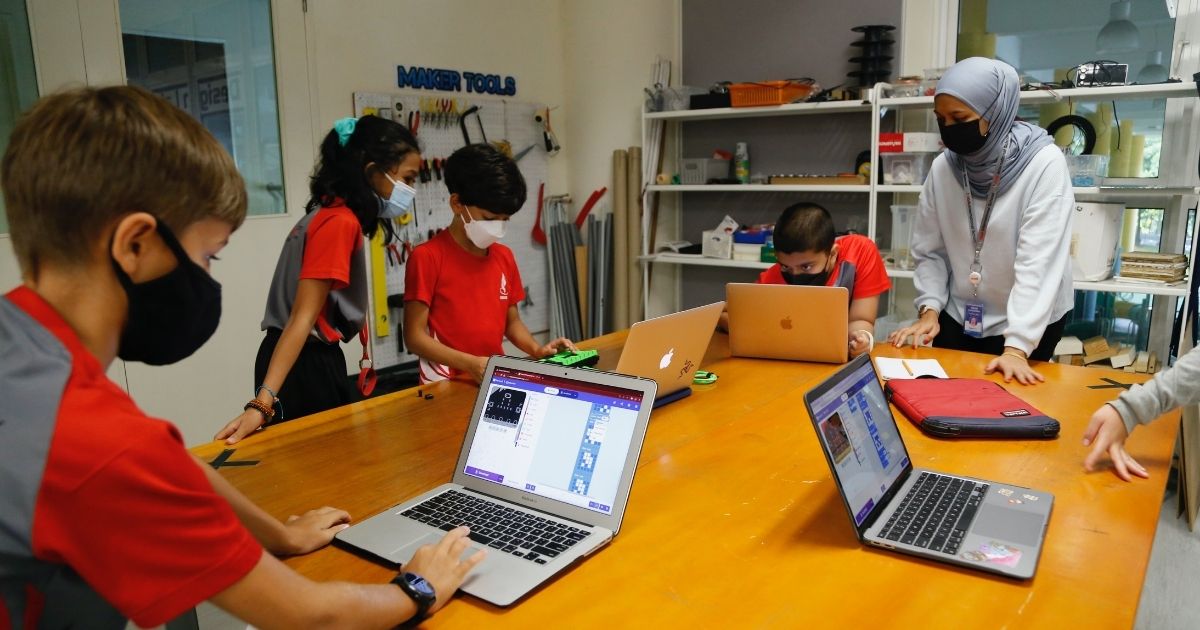IGBIS’ Primary and Secondary Principals Share Distinctive Aspects of The Primary and Middle Years Programmes
 Schooladvisor Team
Schooladvisor TeamThe International Baccalaureate is gaining plenty of interest from parents. So, IGB International School's Primary and Secondary Principals share their views on the Primary and Middle Years Programmes and what everyone can expect from them.
The International Baccalaureate, also known as IB, has been gaining traction from parents thanks to its unique approach to teaching and learning.
To explain the primary school and secondary school aspects of IB and what everyone can expect from being in the IB curriculum, School Advisor was joined by IGB International School’s Simon Millward and Sandy van Nooten, the Elementary School and Secondary School principals, respectively.
Understanding the PYP and MYP frameworks
IB education works in a continuum: a student starts in the Primary Years Programme (PYP), followed by the Middle Years Programme (MYP) and culminates in the Diploma Programme or the Career-related Programme. IGBIS is the only school in Malaysia that offers the 4 programmes of the IB continuum.
Inquiry is a prominent aspect of PYP (which also extends to other IB programmes). The six bodies of knowledge that the students inquire into are:
- Who we are
- Where are we in place and time
- How we express ourselves
- How we organise ourselves
- How the world works
- Sharing the planet

To encourage students to explore and make connections with everything around them, these units are authentically connected to the subjects students learn in PYP. Through this method, students are exposed to transdisciplinary learning, meaning they could learn about sciences through other subjects such as English, Mathematics, social education and more.
Children are encouraged to ask questions surrounding the ‘whats, hows and whys’, all to increase their understanding in an inspiring way.
MYP, on the other hand, allows students to learn all subjects at equal opportunity and time. In addition, throughout their time in MYP, students get involved in community projects and conduct their personal projects.
“The personal project is a passion project where they inquire over an extended period. There is no class dedicated to it, but a teacher is assigned to advise the students,” Ms van Nooten shares.
Learning inevitably involves acquiring knowledge, but with the MYP, this is done through tapping into prior knowledge, providing a context and a purpose, allowing scope for exploration, application and action. We aim to make students thirsty to learn rather than forcing them to memorise facts without meaning or purpose.
Ms van Nooten continues, “We explicitly teach ‘Approaches To Learning’ skills throughout all subjects within the four IB programmes. These ATLs include research, thinking & social skills, communication skills, and self management skills. These skills transcend any one subject area and are hugely important for empowering students and helping them to understand and manage their learning.”
Being in PYP and MYP essentially prepares students to be knowledgeable, capable, thoughtful, caring and empowered human beings. Most students can be successful in an IB programme. All the programs have a ‘low floor and a high ceiling’, meaning that we pick students up where they are on their learning journey and we do not place limits on their potential or progress.

Individualised learning made special
IGBIS teachers are highly qualified in their subjects and have abundant experience teaching the IB curriculum.
Fundamentally, teaching and learning are approached differently with every student, depending on their understanding. Mr Millward says, “Teachers get into every mind and heart of the students. They know the students’ aspirations, families, how they learn, and where they will need to improve. Teachers provide challenges that are appropriate and support the students along the way.”
At IGBIS, teachers facilitate learning, become students’ cheerleaders, advisors and create a meaningful relationship between students and themselves, which leads to a learning experience like no other.
Mr Millward says that you should expect noise in the classrooms at IGBIS. “You will not be sitting at the table to work on a particular thing. The process of learning is collaborative and exciting,” he says.
If the students disagree, the teacher will pitch ways to resolve conflicts and teach them to compromise. This practice helps students learn to respect and see others’ points of view, attributing to IGBIS’ goal to ignite minds and impact lives and to have every student embody the Learner Profile.
Accommodating for different learning needs is common in IB. Good IB teachers regularly ask themselves how they can improve access to their class for an individual child who requires something different. The goal is to help students become empowered, confident and capable.
IGBIS is an inclusive school and we work extremely hard to help all our students progress at every stage of their development. Our students have access to multiple pathways once they reach the final 2 years. Some will choose the full IB Diploma program, some will embark on the Career-related program, while others will choose a range of DP &/or High School courses to suit their needs and aspirations.
The IB is a challenging curriculum, not an elite one. Some schools cherry-pick or discourage students from their IB programs in order to boost school statistics. At IGBIS, we provide guidance, but we encourage students to select the pathway that suits and serves them best. Once that is done, we work like crazy to encourage, support and inspire them.

Assessment methods for PYP and MYP
Assessments in PYP and MYP are a bit different from some other curriculums.
PYP does not use standardised tests to assess the students. Instead, teachers use videos, photographs, diagnostic tools, checklists (and lots more) to determine the students’ progress in their learning journey. Teachers also rely on data collected on each child in the classroom, which is constantly tracked.
Grading is not a norm in PYP, but teachers would have the notes based on the units the children learn, describing their strengths and aspects to improve upon. Mr. Millward points out, “There is no need to attach a number or a letter to what they are doing. What students require is information as to how they can get better.”
Grades are used extensively throughout the five-year MYP programme and students are graded using rubrics and criteria that are set by the International Baccalaureate.
Ms van Nooten notes that MYP students are assessed through a range of diagnostic, formative and summative assessments. Their grades will accumulate and be tracked for the summative evaluation at the end of each semester. “Our parents get ‘live’ access to our gradebooks throughout the year and receive a formal snapshot of their child’s progress twice a year throughout MYP,” she continues.
The MYP assessment results are transparent and made readily available to students and parents to refer to so that they know what areas the students are required to work on to improve in their assessments.
Another aspect of the MYP assessment is the e-Assessment, although Ms van Nooten clarifies that it is totally optional. “Some students are keen to sit for the e-Assessment just because they want to see how they fare on the world stage, while others specifically want a Grade 10 qualification for a particular university application. We would encourage students to sit for the assessment if they want to, and if they don’t want to sit for it, that too, is totally fine.”
From the groundwork of the PYP and MYP, to the learning that goes on in classes at IGBIS, it is clear that the IB curriculum and the IGBIS teachers work incredibly hard to create great human beings who are truly engaged in their learning, empowered to action, and wonderfully reflective.
As IGBIS fulfils its vision and missions with every cohort, we will see more and more IGBIS students adapting and making their mark in the complex and interconnected world.
To learn more and enquire about IGBIS, or any of the IB programs (PYP, MYP, DP or CP), visit www.igbis.edu.my.

